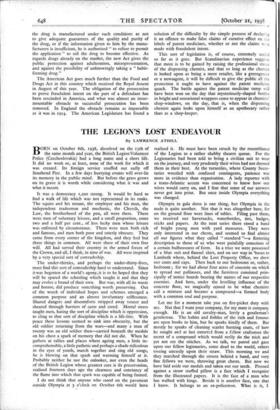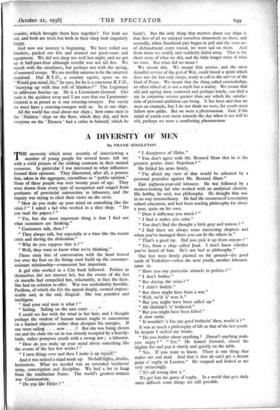THE LEGION'S LOST ENDEAVOUR
By LAWRENCE ATHILL
BORN on October 6th, 1938, dissolved on the 15th of the same month and year, the British Legion Volunteer Police (Czechoslovakia) had a long name and a short life. It did no work or, at least, none of the work for which it was created. Its foreign service snuffed out sadly off Southend Pier. In a few days hurrying events will over-lie its memory in the public mind. But before the grass grows on its grave it is worth while considering what it was and what it meant.
It was a democracy 1,200 strong. It would be hard to find a walk of life which was not represented in its ranks. The squire and his tenant, the employer and his man, the independent tradesman and mechanic, the Church, the Law, the brotherhood of the pen, all were there. There were men of voluntary leisure, and a small proportion, some two and a half per cent., of less lucky men whose leisure was enforced by circumstance. There were men both rich and famous, and men both poor and utterly obscure. They came from every corner of the kingdom, and they had but three things in common. All were there of their own free will. All had served their country in the armed forces of the Crown, and all, I think, in time of war. All were inspired by a very special sort of comradeship.
The under-thirties, and perhaps the under-thirty-fives, must find this sort of comradeship hard to understand. Since it was begotten of a world's agony, it is to be • hoped that they will be spared the schooling which taught it and that they may evolve a brand of their own. But war, with all its waste and horror, did produce something worth, preserving. Out of the wreck of individual hopes and schemes emerged a common purpose and an almost involuntary selflessness. Shared dangers and discomforts stripped away veneer and sheared through barriers of caste and creed. Mortal stress taught men, hating the sort of discipline which is Oppreision, to cling to that sort of discipline which is a life-line. With peace these lessons seemed to sink into obscurity, but the old soldier returning from the wars—and many a man of twenty was an old soldier then—carried beneath the medals on his chest a spark of memory that did not die. When he gathers at rallies and places where ageing men, a little in- comprehensible, a little pathetic and perhaps a shade ridiculous in the eyes of youth, march together and sing old songs, he is blowing on that spark and warming himself at it. Probably neither he nor the onlooker, nor even the heads of the British Legion whose greatest care is its preservation, realised fourteen days ago the clearness and constancy of the flame into which that spark was capable of being fanned.
I do not think that anyone who stood on the pavement outside Olympia at 3 o'clock on October 6th would have realised it. He must have been struck by the resemblance of the Legion to a rather shabby theatre queue. For the Legionaries had been told to bring a civilian suit to wear on the journey, and very prudently their wives had not dressed them in their best. At the turnstiles, where County Secre- taries wrestled with confused contingents, patience was more in evidence than organisation. A lady reporter with a trans-Atlantic accent was concerned to know how our wives would carry on, and I fear that some of our answers never got into print. But once inside Olympia everything was changed.
Olympia in gala dress is one thing, but Olympia in the nude is quite another. Not that it was altogether bare, for on the ground floor were lines of tables. Filing past them, we received our haversacks, waterbottles, ties, badges, sticks and papers. At the next series there stood a band of bright young men with yard measures. They were only interested in our chests, and seemed to find almost all our figures what they called " standard "—a flattering description to those of us who were painfully conscious of a certain bulbousness of form. In a trice we were possessed of a blue suit and flannel shirt, and on our way in 'buses to Lambeth where, behind the Lost Property Office, we drew our 'coats and caps. Then back to our bedrooms or, rather, bedroom ; for we had about four acres of concrete on which to spread our palliasses, and the furniture consisted prin- cipally of notice boards bearing the names of our respective counties. And here, under the levelling influence of the concrete floor, we magically ceased to be what chemists call' a mixture and became a compound—a formed body with a common soul and purpose.
Let me for a moment take you on fire-picket duty with me. Not that I want your company, for my mate is company enough. He is an old cavalry-man, lately a gentleman's gentleman. The habits and foibles of the rich and famous are open books to him, but he speaks kindly of them. But mostly he speaks of cleaning scarlet hunting coats, of how he sought and at last extorted from a fellow craftsman the secret of a compound which would really do the trick and yet not rot the stitches. As we talk, we patrol and gaze upon our fellow legionaries, some dead to the world, others tossing uneasily upon their straw. This morning we and they marched through the streets behind a band, and very fine fellows we were, throwing great chests. &it now we have laid aside our medals and taken out our teeth. Pressed against a straw stuffed pillow is a face" which I. recognise from the illustrated papers. It is the face of a man who has walked with kings. Beside it is another face, one that I know. It belongs to an ex-policeman. What is it, I wonder, -which brought them here together? For both are old, and both are tired, but both in their sleep look singularly happy.
And now our journey is beginning. We have rolled our blankets,. packed our kits and donned our great-coats and equipment. We did not sleep too well last night, and we got up at half-past-four although reveille was not till five. We march with the steadiness, but perhaps not with the spring, of seasoned troops. We are terribly anxious to be the smartest trainload. Our .R.T.O., a - country squire, spurs us on. " Would.you mind, Sir," he says, for he is a courteous R.T.O., "hurrying up with that roll of blankets ?" The Legionary he addresses hurries up. He is a Lieutenant-General. Our train is the quickest away and I am sure that our Lieutenant- General, is as proud as is our crossing-sweeper. For surely we must have a crossing-sweeper with us. So to our ships.
All the world has read about our ships ;•_ how.some men in the Naldera ' slept on the floor, which they did, and how everyone on the Dunera ' had a cabin to himself, which he hadn't. But the only thing that matters about our ships-is that first of all we enjoyed ourselves immensely on them, and secondly, when Southend pier began to pall and the rum( urn of disbandment crept round, we were sad on them. And from them we swiftly and suddenly faded away. That is the short story of what we did, and the little longer story of what we were. But what did we mean ?
We meant this. We meant that service, and the most dreadful service of the god of War, could breed a spirit which does not die but only sleeps, ready at call to the service of the God of Peace. We meant that the thing called comradeship, so often talked of, is not a myth but a reality. We meant that old-and ageing men, scattered and perhaps lonely, can find a joy in corporate service greater than any which the satisfac- tion of personal ambition can bring. It has been said that we were an example, but I do not think we were, for youth must follow new paths. But we were a phenomenon. And, if the mind of youth ever turns towards the day when it too will be old, perhaps we were a comforting phenomenon.
















































 Previous page
Previous page